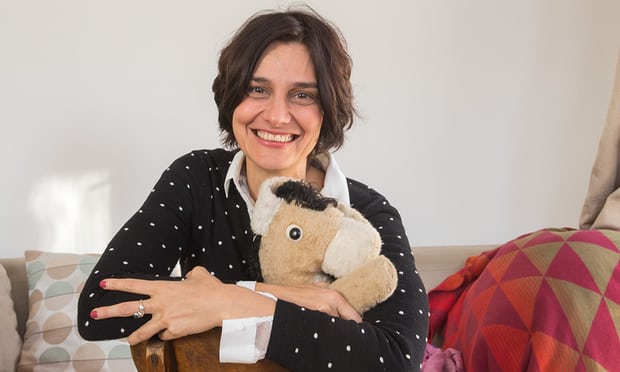Lara Feigel
The Guardian
Thu 1 Feb 2018 12.00 GMT Last modified on Thu 1 Feb 2018 12.49 GMT
Petrowskaya’s relatives, as described in this bestselling Sebaldian memoir, collectively conjure up the Russian revolution, the world wars and the Holocaust
In 1941 an elderly woman who might have been called Esther, great-grandmother of Katja Petrowskaja, remained in her apartment in Kiev when her family left. They told her that they’d be back soon; in fact they took seven years to return. In the meantime, Esther took it on herself to follow the instructions of the Germans that all Jews were to report to the central square. Frail though she was, she sought her neighbours’ assistance in leaving her apartment and walking doggedly to her death.
In her great-granddaughter’s memoir, a bestseller on the continent, the word “maybe” has come to describe not just Esther herself but the whole of her family’s history and its telling. Indeed, it’s hard to define what kind of book Maybe Esther is, except to say that it’s a book about European history by a woman who is Russian by origin but living in Germany, and whose relatives collectively conjure up the 20th century: the Russian revolution, communism, the world wars, the Holocaust.
At a time when the meaning of Europe has become a question, this is a book that suggests the answer lies in the intertwined histories of the rootless. As a narrative, Maybe Esther calls to mind the itinerant style of WG Sebald. Petrowskaja begins, as he memorably did, in a European train station, in this case surrounded by a wasteland that remains a “void in the midst of the city, a void that no government can fill, no lavish buildings, no good intentions”. Here she awaits “an express train that moves according to schedule but against time”, taking her to Warsaw in search of her own history. Along the way, she talks to an elderly couple in search of theirs. “I always meet people who are looking for the same thing I am,” she tells them, convinced that “God googles our paths, so that we stay put in our grooves”, compelled to repeat the same search for a meaning that continues to elude us.
If there is a plot here, it takes the form of the quest that leads Petrowskaja across Russia, Ukraine, Poland and Germany in search of relatives united by their Jewishness, their tendency to survive at least long enough to beget more relatives, and their commitment to teaching the deaf and speech-impaired. The quest begins with mere curiosity but becomes an obsession: Petrowskaja “no longer knew why I was searching” and “wanted a complete return, like the fairy tale of the golden key lying on the bottom of the marsh”.
————
The quest leads Petrowskaja across Russia, Ukraine, Poland and Germany in search of relatives united by their Jewishness
————
The strength of this obsession has to be taken as read. This isn’t a book in which we learn enough about either the narrator’s present circumstances or her psychological make-up to understand what is driving her. The personal details tend to feel at the same time random and symbolic – we learn, for example, that she is exactly 100 years younger than Lenin. Yet the writing is rich and the vignettes she unearths are intriguing.
Perhaps the central story is the account of the deaf-mute schools run by seven generations of her relatives. Her great-grandfather married a woman who couldn’t speak or hear, though the marriage has itself become one of the mute secrets of her family history. These schools are both specific historical institutions and a metaphor for the central themes of the book. The teaching of deaf and mute people is a metaphor for secrecy (“anyone who does not speak must be hiding something”) and for Jewishness: both for the Jewish enlightenment, spreading learning by passing it from mouth to mouth, and for the necessary silence involved in 20th-century Jewishness. “Our Jewishness,” Petrowskaja writes, “was deaf-mute, and deaf-muteness was Jewish. This was my history and my heritage, yet it was not me.”
She takes refuge in a personal form of muteness. “We were a Soviet family,” she states, yet she is writing this book in German, a language that most of her remaining family cannot understand. German seems to offer her a window on to strangeness.
It’s one of the many pleasing quirks observed here that the Russian word for the German language, nemetskiy, is etymologically “the language of the mute”. “The Germans for us are the mute, nemoy nemets; the Germans cannot speak at all.” Perhaps Petrowskaja’s ultimate achievement in this remarkable book is to have forged a language out of muteness; a language quiet enough to enable her to find a way to describe the indescribable events of the last century with more beauty and curiosity than horror.
Lara Feigel’s Free Woman: Life, Liberation and Doris Lessing will be published by Bloomsbury in March.
• Maybe Esther, translated by Shelley Frisch, is published by 4th Estate. To order a copy for £12.74 (RRP £14.99) go to bookshop.theguardian.com or call 0330 333 6846. Free UK p&p over £10, online orders only. Phone orders min p&p of £1.99.
Source: www.theguardian.com/books/2018/feb/01/maybe-esther-katja-petrowskaja-review




